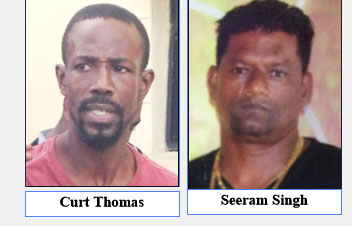Curt Thomas was yesterday afternoon handed a 70-year sentence for the murder of Parika fuel dealer Seeram Singh whom he shot and killed during a robbery on the night of April 30th, 2016, at Parika Outfall, East Bank Essequibo.
He had been convicted by a jury last Thursday, but because of his unruly outbursts, his attorney requested some time to consult on whether he wished a probation report before his sentencing.
The court was informed yesterday, however, that Thomas did not care for a probation report.
When given a chance to speak, the convict apologized to the judge for his behaviour following the announcement of the verdict, but remained adamant that he had nothing to do with the crime.
In his impassioned address to the court, Thomas said that he was innocent, that he never killed or robbed anyone and that he did not know Singh or any of the witnesses who testified against him.
He said that he does not own and never owned a gun, nor does he have any reason to kill or rob anyone as he was gainfully employed.
According to Thomas, the police had framed and pinned the charge on him, stating further that it was the lawmen that had taken his clothes and placed gunpowder residue on it to implicate him in the murder.
“I am being honest. I don’t take life, I give life. I am being honest with you my Honour,” a visibly angry Thomas told Justice Navindra Singh from the Lusignan Prison where he attended the proceedings virtually.
Thomas said that his two teenaged sons were devastated by news of his conviction as is his mother who suffers from diabetes and hypertension and whose condition has since worsened.
In her address to the court, however, Prosecutor Tuanna Hardy asked the judge to impose a sentence that would reflect the nature and gravity of the offence and one that would send a strong message of deterrence to potential offenders.
She said that persons must be able to enjoy the fruits of their labour and hard-earned money and not be robbed of their valuables—moreso their lives.
Pointing out that Thomas even to the point of being sentenced expressed not an iota of remorse for the loss of life or even respect for the verdict of the jury, Hardy said that his actions on the night in question had been premediated.
She said that his indiscriminate use of the firearm showed a reckless disregard for the lives of other persons at the scene.
A victim impact statement read by Hardy, which she said had been submitted by the dead man’s daughter, detailed how much she and her siblings miss their father and what a good man he was not only to his family but the community at large.
The court heard that Singh’s death had been particularly devastating as it came three years after the children had lost their mother.
Further, after their father’s death, the daughter related in the statement that they then lost their sister who had become traumatized and depressed shortly after testifying at the preliminary inquiry before the Magistrate’s Court.
The daughter expressed her satisfaction that justice had finally been served and that the person who had committed the heinous act against her father would finally pay for his actions.
Referencing the evidence presented at trial, Justice Singh in imposing sentence said it does seem that the act was premeditated.
The judge commenced the sentence at a base of 60 years which he said is the base for his court. To that he added 10 years for the robbery carried out on the deceased and an additional five years for the use of a gun.
However, from that 75-year total, the judge deducted five years for the time Thomas would have so far spent behind bars awaiting trial.
Justice Singh then ordered that 40 years be served before the convict becomes eligible for parole.
In an unsworn statement last Tuesday, Thomas, also known as `Deportee’ and `Yankee’, had said he was never at or near the scene of the murder and that he did not know Singh.
According to him, his girlfriend and one of the primary investigators, whom he identified as “Officer Bowman,” once shared a relationship and he believed that to be the reason he was charged with the crime.
It was the state’s case that Thomas had shot, killed and robbed Singh.
The prosecutor had asked the jury to rely on the testimony of her witnesses which she said substantiated the charge against Thomas.
Eyewitness Rajmohan Autar had told the court that he saw Thomas shoot and rob Singh of his gold chain on the night in question. He subsequently pointed him out in an identification (ID) parade.
But defence attorney Lyndon Amster-dam in his address to the jury sought to discredit Autar’s testimony, pointing out that “many variations” were given by the witness which were uncovered under cross-examination. Against this background, he had asked the jury not to rely on Autar’s evidence.
The defence was contending that Autar, who had admitted to being mistaken in identifying persons before, was also on this occasion mistaken—which Autar admitted under cross- examination was possible.
Thomas’ trial was heard before the High Court in Georgetown.





